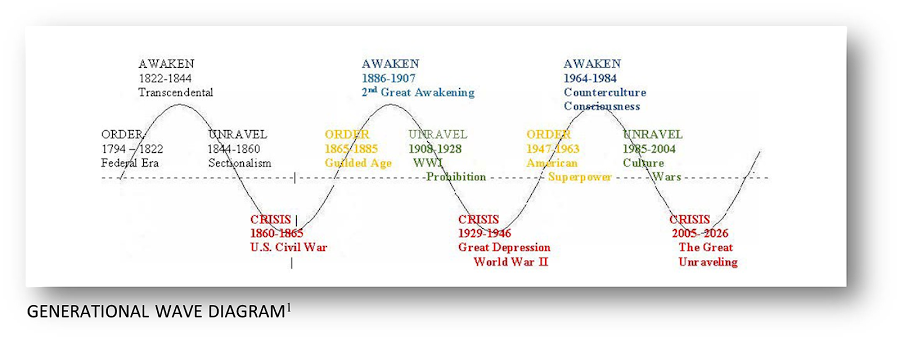 |
| 1860 - 1865 - FIVE PAGE TIMELINE |
- FORMAT - PDF
- A TIMELINE OF 5 PAGES
- 9 COMMENTARIES.
TIMELINE AND COMMENTARIES @ $3.00
ABOUT THIS GENERATION
Prior
to 1860, massive immigration from Europe nearly doubled the U.S. population –
much of it from Germanic countries who brought a very different culture,
religion and politics. This spawned anti-immigration hostilities by the
Ku-Klux-Klan.
THIS GENERATION …
“[This
generation] began with a presidential election that many southerners
interpreted as an invitation to secede. The attack on Fort Sumter triggered the
most violent conflict ever fought on New World soil. The war reached its climax
in the Emancipation Proclamation and Battle of Gettysburg (in 1863). Two years
later, the confederacy was beaten into bloody submission and Lincoln was
assassinated – a grim end to a crusade many had hoped would “trample out the
vintage where the grapes of wrath are stored.”[1]
COMMENTARIES INCLUDE
1840 – 1860s German Immigration, 6-million fled European political revolutions. “…Cities along the Great Lakes, the Ohio River, and the Mississippi and Missouri Rivers attracted a large German element…. Radical Germans trained in politics in the old country dominated the city’s (Milwaukee’s) Socialists. Skilled workers dominated many crafts, while entrepreneurs created the brewing industry; the most famous brands included Pabst, Schlitz, Miller, and Blatz.”[1]
1857 – New York City, Frederick Douglass Corrects the Record Regarding the Constitution and Slavery. "’We, the people’" – not we, the white people – not we, the citizens, or the legal voters – not we, the privilege class, and excluding all other classes, but we, the people; not we the horses and cattle, but we, the people – the men and women, the human inhabitants of the United States, do ordain and establish this Constitution, etc.”[2] “Constitutionality and Slavery, Frederick Douglas Sets The Record Straight,” From “Dred Scott Decision”, Lapham Quarterly
1860 - 1871 – The Ku Klux Klan – “The first of three distinct KKK movements which opposed Federally imposed state governments during Reconstruction and advocated extremist reactionary positions such as white supremacy, white nationalism, and anti-immigration often through violence. This movement was suppressed by Federal force around 1871.”[3]
1861 – The American People Call For Prayer and Thanksgiving – “ABRAHAM LINCOLN: In the 1840’s – Sarah Hale (Editor of Godey’s Lady Book magazine) – through the power of her spirit and her pen – organized some 29 states and territories to unite in a common Thanksgiving celebration. From as far away as Dallas, Texas in 1861 – came reports that people were taking up Sarah Hale’s dream of uniting all faiths in prayer.”
1862 – Henry David Thoreau A Memorial Essay – By Ralph Waldo Emerson – “His virtues, of course, ran into extremes.”
1862 - Imagine A New Recruit In The Civil War – At Gettysburg - Lt. Col. Dave Grossman, “The Civil War soldier was, without a doubt, the best trained and equipped soldier yet seen on the face of the earth. Then came the day of combat, the day for which he had been drilled and marched for so long.” What happened stunned the Generals.
1862 – 27,574 Muskets Recovered At Battlefield Of Gettysburg. Lt. Col Dave Grossman - 27,574 MUSKETS RECOVERED FROM THE BATTLEFIELD. Ninety percent (24,000) were loaded. 12,000 were loaded more than once. 6,000 had three to ten loads. One was loaded twenty three times. Grossman tells why.
1865 - Mill Children – “After the Civil War, many families were either forced into sharecropping or find another way to provide for their family because the vast majority of rural Americans had little if no education. Since many of the cotton mills offered a village setting, many families came to the mills because they needed to put members of the family to work in order to make ends meet.”
1865 - Freedmen’s Bureau – “The Freedmen's Bureau was an important agency of early Reconstruction, assisting freedmen in the South. The Bureau was made a part of the United States Department of War, as it was the only agency with an existing organization that could be assigned to the South. <snip> By 1870, there were more than 1,000 schools for freedmen in the South.[14]”
[2] From “The Dred Scott Decision". Douglas,
who had escaped to freedom in 1838, delivered this address to the American
Abolition Society; four years later came the first shots of the Civil War. LAMPHAM
QUARTERLY, Volume XI, Number 2, Spring 2018
“Rule Of Law”, pages 44 – 48
